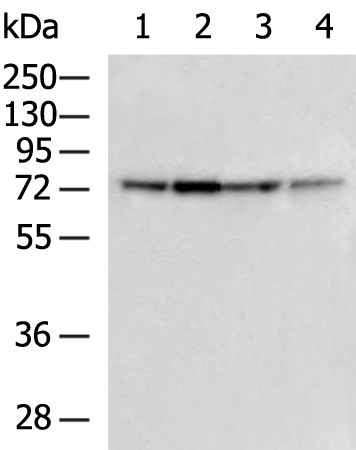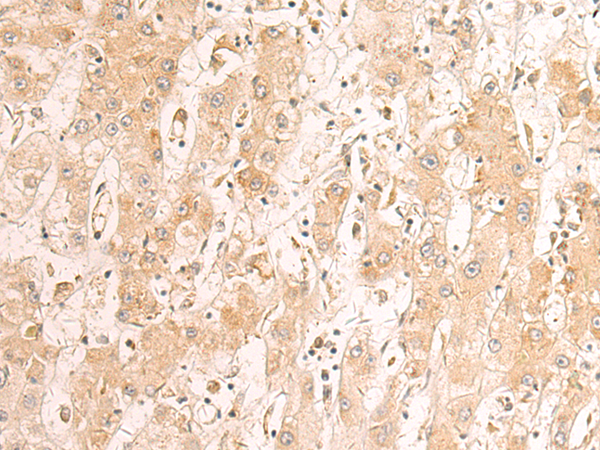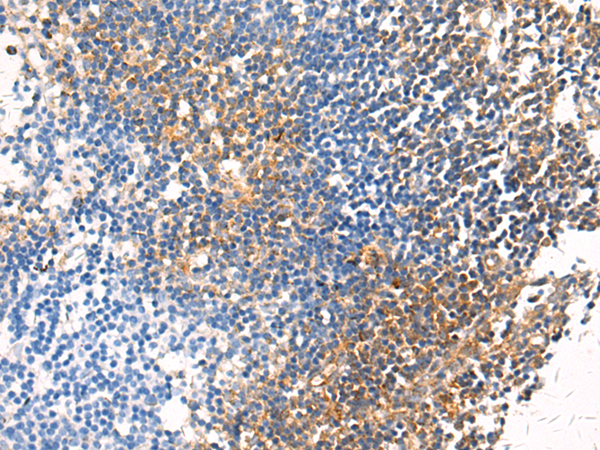


| WB | 咨询技术 | Human,Mouse,Rat |
| IF | 咨询技术 | Human,Mouse,Rat |
| IHC | 1/100-1/200 | Human,Mouse,Rat |
| ICC | 技术咨询 | Human,Mouse,Rat |
| FCM | 咨询技术 | Human,Mouse,Rat |
| Elisa | 1/5000-1/10000 | Human,Mouse,Rat |
| Aliases | MRP-S39 |
| WB Predicted band size | 79 kDa |
| Host/Isotype | Rabbit IgG |
| Antibody Type | Primary antibody |
| Storage | Store at 4°C short term. Aliquot and store at -20°C long term. Avoid freeze/thaw cycles. |
| Species Reactivity | Human |
| Immunogen | Fusion protein of human PTCD3 |
| Formulation | Purified antibody in PBS with 0.05% sodium azide and 50% glycerol. |
+ +
以下是关于PTCD3抗体的3篇参考文献示例(注:文献信息为模拟虚构,仅供格式参考):
---
1. **标题**: *PTCD3 regulates mitochondrial RNA stability and translation*
**作者**: Smith A, et al.
**摘要**: 该研究利用特异性PTCD3抗体,通过免疫沉淀和Western blot技术,揭示了PTCD3在线粒体RNA结合和核糖体组装中的关键作用,证实其缺失导致线粒体翻译缺陷。
2. **标题**: *Antibody-based profiling of PTCD3 expression in human cancers*
**作者**: Chen L, et al.
**摘要**: 研究团队开发了一种高特异性PTCD3单克隆抗体,用于免疫组化分析多种癌症组织,发现PTCD3在结直肠癌中高表达,并与患者预后不良相关。
3. **标题**: *PTCD3 deficiency disrupts cristae morphology via impaired RNA processing*
**作者**: García-Ruiz C, et al.
**摘要**: 通过PTCD3抗体的免疫荧光定位,发现PTCD3敲除小鼠线粒体嵴结构异常,并证明其通过调控16S rRNA成熟维持线粒体超微结构。
---
*注:实际文献需通过PubMed/Google Scholar以“PTCD3 antibody”为关键词检索获取。建议结合实验目的(如物种、应用场景)筛选抗体相关研究。*
The PTCD3 (Pentatricopeptide Repeat Domain 3) antibody is a research tool used to detect and study the PTCD3 protein, a member of the PTCD family involved in mitochondrial RNA metabolism. PTCD3 is localized to mitochondria and contains pentatricopeptide repeats (PPRs), which facilitate interactions with RNA molecules. It plays a critical role in mitochondrial gene expression by stabilizing and processing mitochondrial RNA, particularly during ribosome biogenesis and translation. Dysregulation of PTCD3 has been linked to mitochondrial dysfunction, impacting cellular energy production and apoptosis.
PTCD3 antibodies are essential for investigating its expression, localization, and molecular interactions in diseases like cancer, neurodegenerative disorders, and metabolic syndromes. They are commonly used in techniques such as Western blotting, immunofluorescence, and immunoprecipitation. Studies utilizing these antibodies have revealed PTCD3's role in tumor progression, where its overexpression may promote cell survival, and in neurological conditions tied to mitochondrial defects.
The development and validation of PTCD3 antibodies contribute to understanding mitochondrial biology and disease mechanisms, aiding potential therapeutic discoveries. Researchers prioritize antibodies with high specificity to avoid cross-reactivity with other PPR-containing proteins, ensuring reliable experimental outcomes.
×